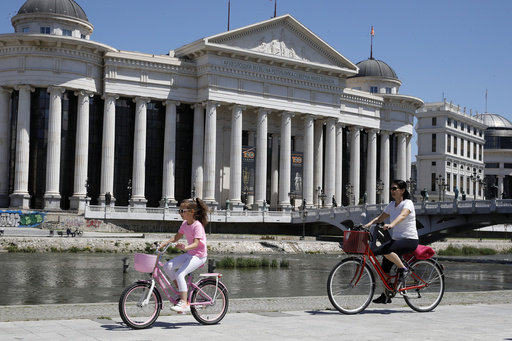SKOPJE, North Macedonia (AP) — Voters in Northern Macedonia go to the polls Wednesday for a double election — parliamentary and presidential — following a campaign in which the country’s aspirations to join the European Union have played a central role.
The office of prime minister wields the real power, and the president is largely ceremonial, so the parliamentary election is the more important of the two contests. The opposition center-right coalition, which is pushing back against neighboring Bulgaria’s conditions for the country’s EU candidacy, is favored to win both elections.
The election for the unicameral parliament takes place in a single round, while the presidential election is the runoff of a two-round contest that began in April with the center-right candidate scoring a large lead over the center-left incumbent.
More than 1,700 candidates are competing for the unicameral parliament’s 120 seats. There are also three seats reserved for expatriates, but in the last election, in 2020, turnout was too low to fill those seats.
WHAT IS AT STAKE?
The month-long campaign has focused on fighting corruption, improving the slugging economy and alleviating poverty, but the main hot-button issue has been over North Macedonia’s struggle to join the European Union.
Demands by neighboring Bulgaria that North Macedonia’s Bulgarian minority be official recognized in the country’s constitution have been supported by the ruling center-left, but blasted by the center-right opposition as capitulation to Bulgaria.
Only a tiny fraction of the country’s 1.84 million people — just over 3,500 — described themselves as Bulgarians in the last census in 2021.
North Macedonia has been a candidate to join the European bloc since 2005, but was blocked for years by a dispute with neighboring Greece, which objected to the country calling itself Macedonia, arguing that it conflicted with Greece’s region of Macedonia.
That dispute was resolved in 2018 with the country calling itself North Macedonia. But Bulgaria has since been blocking the country’s EU bid, saying it will lift its veto only when North Macedonia amends its constitution.
Formal EU membership negotiations with North Macedonia — and fellow-candidate Albania — began in 2022 and the process is expected to take years.
VMRO-DPMNE, the party the leads the center-right opposition, had once threatened to scupper the agreement with Greece over using the Macedonia name, but it has since toned down its rhetoric. Observers point to its membership in the European People’s Party and its friendly relations with the German Christian Democrats as evidence that the party will not seek to back out of the agreement.
CORRUPTION
North Macedonia has been cited by both the European Commission and the U.S. government as having a corruption problem, and the opposition has seized on the issue during the campaign.
VMRO-DPMNE leader and election favorite Hristijan Mickoski has accused the ruling center-left coalition of presiding over a “pandemic” of corruption, though his own party’s record is far from clean. The VMRO-DPMNE’s last prime minister, Nikola Gruevski, is a fugitive from justice in Hungary.
Dimitar Kovachevski, leader of the Social Democratic Union of Macedonia, or SDSM, party that heads the ruling coalition, said he is aware that people are dissatisfied and has acknowledged that more could have been done to fight corruption. He has backed measures to confiscate illegally acquired property from corrupt officials.
A 2023 European Commission report said corruption “remains prevalent in many areas” of North Macedonia. In December, the U.S. Ambassador to North Macedonia, Angela Aggeler, said there was “an epidemic of corruption in this country that has affected every sector, every organization, and only by exposing the corrupt actors can we begin to help the country address these issues.”
WHO IS RUNNING
The main two blocs are multi-party coalitions: The center-left coalition led by the SDSM, “For a European Future,” consists of 14 parties. The center-right opposition led by VMRO-DPMNE, “Your Macedonia,” has 22.
For the presidency, incumbent Stevo Pendarovski of the SDSM is the clear underdog to Gordana Siljanovska Davkova of VMRO-DPMNE, who won 41.2% of the vote in the first round on April 24 to Pendarovski’s 20.5%.
The two had also squared off in the last presidential election in 2019, with Pendarovski winning 53.8% to 46.2% in the runoff.
Both big coalitions represent mostly ethnic Macedonians and other, small minorities. Two separate coalitions, “European Front” and VLEN (“Worth”) are contesting to represent the country’s largest minority, the Albanians, who represent about a quarter of the 1.84 million population.
The “European Front,” a coalition of nine parties, is dominated by the Democratic Union for Integration (DUI). DUI, founded by people who took part in the 2001 secessionist rebellion, has been the coalition partner of every government for the past two decades.
However, the VMRO-DPMNE leader Mickoski has declared he would prefer to form a government with VLEN, itself a coalition of four parties, which has positioned itself to the right of DUI.
Polling has consistently been showing Mickoski’s coalition ahead of the SDSM-led coalition by a double-digit margin.
A splinter Social Democrat Party, ZNAM (“For Our Macedonia”) whose leader, Maksim Dimitriavski, won 9.5% of the vote in the first round of the presidential election, could play kingmaker.


